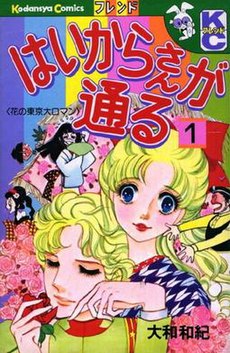Haikara-san ga Tōru
| Haikara-san ga Tōru | |

Cover of the first manga volume
|
|
| はいからさんが通る | |
|---|---|
| Genre | Comedy, Drama |
| Manga | |
| Written by | Waki Yamato |
| Published by | Kodansha |
| Demographic | Shōjo |
| Magazine | Shōjo Friend |
| Original run | 1975 – 1977 |
| Volumes | 8 |
| Anime television series | |
| Directed by | Kazuyoshi Yokota |
| Studio | Nippon Animation |
| Original network | TV Asahi |
| Original run | June 3, 1978 – March 31, 1979 |
| Episodes | 42 |
| Live-action television film | |
| Directed by | Shinji Ueda |
| Original network | KTV |
| Released | 1979 |
| Live-action television film | |
| Original network | Fuji TV |
| Released | 1985 |
| Live-action film | |
| Directed by | Masamichi Satō |
| Written by | Takaya Nishioka |
| Studio | Toei |
| Released | December 12, 1987 |
| Runtime | 90 minutes |
| Live-action television film | |
| Original network | TBS |
| Released | 2002 |
| Anime film | |
| Gekijōban Haikara-san ga Tōru Zenpen ~Benio, Hana no 17-sai~ | |
| Directed by | Kazuhiro Furuhashi |
| Written by | Kazuhiro Furuhashi |
| Released | 2017 |
| Anime film | |
| Directed by | Kazuhiro Furuhashi |
| Released | 2017 |
Haikara-san ga Tōru (Japanese: はいからさんが通る?), also known as Smart-san or Mademoiselle Anne, is a Japanese shōjo manga series by Waki Yamato. It was serialized by Kodansha in the magazine Shōjo Friend from 1975 to 1977. The title can be literally translated into English as Here Comes Miss Modern, Here Comes Miss High-Collar ("haikara" being the Japanese version of "high collar"), or Fashionable Girl Passing By. In 1977, it was awarded the 1st Kodansha Manga Award for shōjo.
The series was later adapted as a 42-episode anime television series produced by Nippon Animation, which aired in Japan on TV Asahi in Tokyo and other local stations across the country from June 3, 1978 to March 31, 1979. The anime was later rebroadcast across Japan on the anime satellite television network Animax and on NHK satellite channel BS2. The manga was also adapted into three television drama specials and theatrical film. Two anime films has been announced to be released in 2017.
The haikara of the title is Benio Hanamura (voiced by: Keiko Yokozawa, known as Anne or Marie in European dub versions of the anime), a 17-year-old schoolgirl in Tokyo circa 1920 (during the Taishō era). Benio lost her mother when she was very young and has been raised by her father, a high-ranking official in the Japanese army. As a result, she has grown into a tomboy - contrary to traditional Japanese notions of femininity, she studies kendo, drinks sake, dresses in often outlandish-looking Western fashions instead of the traditional kimono, and isn't as interested in housework as she is in literature. She also rejects the idea of arranged marriages and believes in a woman's right to a career and to marry for love. Benio's best friends are the beautiful Tamaki (voiced by: Rihoko Yoshida), who is much more feminine than Benio but equally interested in women's rights, and Ranmaru (voiced by: Kazuko Sugiyama), a young man who was raised to play female roles in the kabuki theater and as a result has acquired very effeminate mannerisms.
...
Wikipedia
